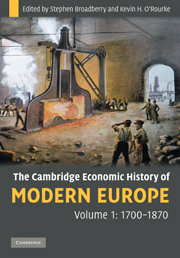Book contents
11 - Europe in an Asian mirror: the Great Divergence
Published online by Cambridge University Press: 05 August 2012
Summary
Europe is a peninsula to Asia.
Fernand BraudelWhy did sustained industrialization and modern economic growth first take off in western Europe and not elsewhere? Attempts to address this historical conundrum have spawned a large literature related to the theme of “European exceptionalism.” It champions the view that Europe, in particular northwest Europe, had superior, and in some cases exceptional, economic conditions and social institutions long before its economic take-off in the modern era. This widely prevalent and often contentious view has recently been contested by a new wave of historians and specialists on Asia such as Ken Pomeranz, Bin Wong, and Prasannan Parthasarathi. They marshalled evidence to show that living standards in the advanced parts of China and India were on a par with those of northwest Europe in the eighteenth century. The revisionists have also put forward various hypotheses to reinterpret the traditional story of the “rise of the West and the fall of the Rest” in terms of factor and resource endowments, the impact of Western colonization and, most importantly, historical path dependencies.
This chapter provides a broad but selective survey of the major hypotheses and evidence regarding historical comparisons of the economic performances of India and China versus western Europe. We begin with a review of the latest research on the comparison of real wages across Eurasia, which reveals that living standards in the advanced parts of China, Japan, and India as measured by real wages seem to have been closer to the lagging parts of Europe – namely, southern and central Europe – than to northwest Europe, as was claimed by the revisionists.
- Type
- Chapter
- Information
- The Cambridge Economic History of Modern Europe , pp. 264 - 285Publisher: Cambridge University PressPrint publication year: 2010
- 7
- Cited by

